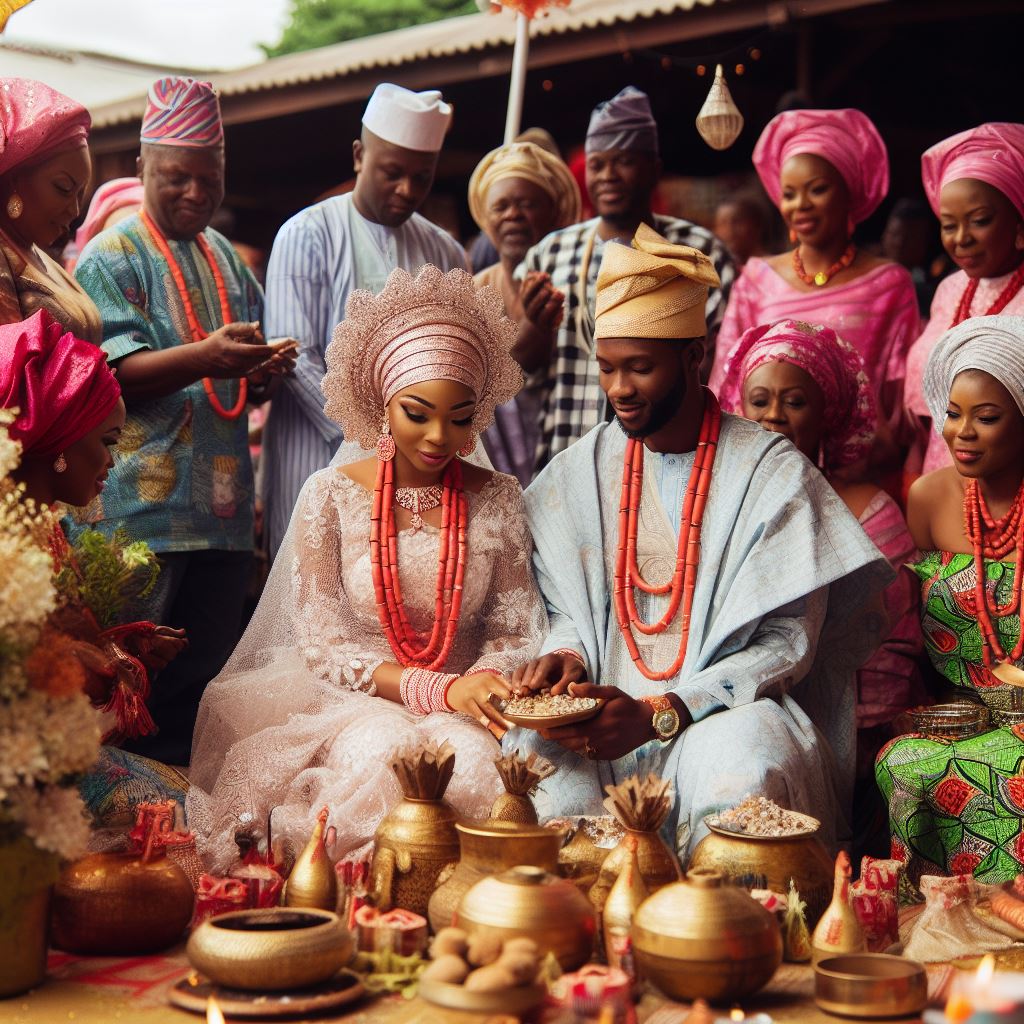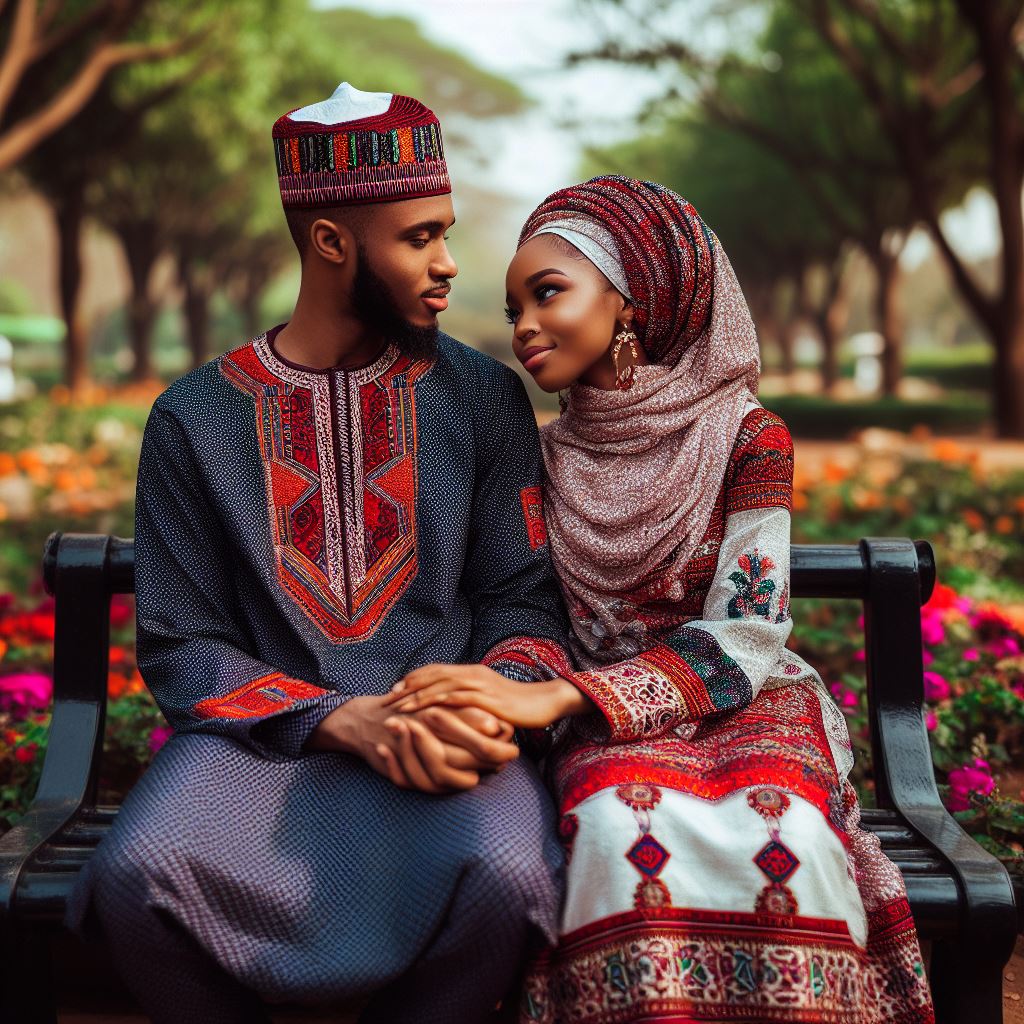Introduction
Marriage is a sacred institution, but Nigerian couples face various common issues today.
Understanding these challenges is vital as they greatly impact the dynamics of relationships.
The blog section will explore the common marriage issues faced by Nigerian couples and shed light on their significance.
Recognizing these challenges helps couples navigate them effectively and strengthen their bond.
Lack of Communication
In any relationship, communication plays a pivotal role in maintaining a healthy and harmonious bond between partners.
Nigerian couples today often face the challenge of a lack of effective communication, leading to numerous issues within their marriages.
Communication Breakdown and Misunderstandings
- Limited communication can create misunderstandings and conflicts between Nigerian couples.
- When partners fail to express their thoughts and feelings, it becomes difficult to understand each other’s perspectives.
- Words left unsaid or misunderstood can build resentment, causing a rift in the relationship.
- Without open and honest communication, assumptions and misinterpretations prevail, further exacerbating marital issues.
The Importance of Effective Communication
- Effective communication serves as the foundation for a healthy and successful marriage.
- It enables Nigerian couples to express their needs, expectations, and concerns honestly and openly.
- Through communication, spouses can establish a deeper emotional connection and build trust.
- Sharing thoughts and discussing problems together allows couples to find mutually beneficial solutions.
- Effective communication promotes understanding, empathy, and intimacy within a marriage.
Practical Tips for Improving Communication Skills
Here are some practical tips Nigerian couples can employ to enhance their communication skills and strengthen their marriages:
- Active Listening: Give your partner undivided attention, maintain eye contact, and show genuine interest in what they are saying.
- Express Feelings: Be open and honest about your emotions, sharing both positive and negative feelings with your spouse.
- Use “I” Statements: Instead of blaming your partner, express concerns using “I” statements to take ownership of your emotions.
- Clarify and Ask Questions: Seek clarity when something is unclear and ask questions to gain a deeper understanding.
- Timing Matters: Choose an appropriate time and place for important discussions to ensure both partners are emotionally ready.
- Show Empathy: Make an effort to understand your partner’s perspective and validate their feelings without judgment.
- Maintain Calmness: Avoid yelling or becoming defensive during conflicts, as it hinders effective communication.
- Seek Professional Help: If communication problems persist, consider seeking guidance from a marriage counselor.
- Regular Check-Ins: Establish a routine of regularly discussing each other’s needs, goals, and challenges.
- Non-Verbal Communication: Pay attention to non-verbal cues such as body language, facial expressions, and tone of voice.
Implement communication strategies to bridge gaps in Nigerian couples due to ineffective communication.
- Communication is ongoing and needs effort from both partners.
- Open, honest dialogue nurtures healthier, fulfilling marriages with understanding, trust, and emotional connection.
Read: Overcoming Infidelity: How Marriage Counseling Can Help
Financial Challenges
Financial challenges in Nigerian marriages are prevalent, with limited income and debt causing strain and stress.
Couples face the following financial challenges:
- Limited income impedes meeting basic needs and financial goals.
- High debt levels lead to stress and difficulty fulfilling obligations.
Financial stress in marriage can:
- Result in constant arguments and disagreements.
- Affect emotional well-being and overall happiness.
Couples can manage finances effectively by:
- Openly discussing income, expenses, and debts.
- Setting shared financial goals for motivation and support.
- Creating and adhering to a budget.
- Developing a culture of saving as a couple.
- Addressing debts together and creating a repayment plan.
- Seeking professional financial advice when necessary.
Basically, Nigerian couples face common financial challenges, but proactive financial management can bring balance and harmony to their relationships.
Read: Anniversary Reflections: Nigeria’s Romantic Traditions
Cultural Differences and Expectations
Cultural disparities often lead to conflicts in Nigerian marriages, complicating communication and straining relationships.
Key aspects of cultural differences include:
- Language
- Customs
- Traditions
- Family expectations
- In-law dynamics
- Societal pressures
To navigate these challenges:
- Promote open and honest communication.
- Listen actively without criticism.
- Engage in cultural exchange.
- Attend cultural events together.
- Consider couples therapy.
- Establish boundaries with in-laws.
- Create a safe environment for discussions.
- Support individuality and growth.
- Commit to compromise and flexibility.
Ultimately, acknowledging and embracing diversity, along with open communication, respect, and cultural understanding, can lead to harmonious and fulfilling Nigerian marriages.
Read: The Complete Guide to Marriage Certificates in Nigeria
Infidelity and Trust Issues
Infidelity is a prevalent issue in Nigerian marriages, causing significant damage to trust and relationships.
Prevalence of Infidelity in Nigerian Marriages
Infidelity is unfortunately widespread in Nigerian marriages, cutting across various socio-economic backgrounds.
This behavior has detrimental consequences, leading to broken trust, emotional pain, and psychological trauma.
The impact of infidelity can ripple through families, affecting children and extended relatives.
Causes of Infidelity
- Lack of communication and emotional connection in a marriage can push individuals towards infidelity.
- Unresolved conflicts and unresolved sexual desires can also contribute to seeking comfort outside the marriage.
- The influence of societal norms that condone or romanticize infidelity adds to the prevalence.
Challenges in Rebuilding Trust
- Rebuilding trust after infidelity is a daunting task, requiring commitment, patience, and both partners’ active involvement.
- The betrayed spouse may struggle with feelings of insecurity, doubt, and fear of further betrayal.
- The unfaithful partner faces the challenge of regaining trust and proving their commitment to change.
Guidance on Healing and Rebuilding Marriage
- Seeking professional counseling and therapy can be beneficial for both individuals and the marriage as a whole.
- Open and honest communication is crucial, allowing both partners to express their emotions and concerns.
- Setting clear boundaries and expectations helps establish a sense of security within the relationship.
- Rebuilding trust requires consistent effort, including transparency, accountability, and demonstrating genuine remorse.
- Forgiveness is a gradual process, and both partners must be willing to work towards it.
- Developing shared goals, cultivating intimacy, and nurturing the emotional connection helps in rebuilding the marriage.
- Building a support network of trusted friends, family, or support groups can provide encouragement and guidance.
- It is essential to recognize that healing takes time and progress may not always be linear.
In summary, infidelity poses a significant challenge to Nigerian couples, eroding trust and straining relationships.
However, with dedication, open communication, and professional guidance, it is possible to heal and rebuild a marriage after infidelity.
Patience, commitment, and a shared willingness to work through the pain are crucial in restoring trust and creating a stronger bond.
Read: Igbo Anniversary Messages: Blending Love & Culture

Gender Roles and Expectations
Gender expectations play a significant role in Nigerian marriages, shaping the dynamics and interactions between couples.
However, these traditional roles often clash with modern societal changes, creating challenges for couples to navigate.
Role of Gender Expectations in Nigerian Marriages
Gender expectations in Nigerian marriages are deeply rooted in cultural and religious traditions.
Men are traditionally expected to be the breadwinners, while women are supposed to be submissive homemakers.
These expectations influence decision-making, division of household chores, and overall power dynamics within the relationship.
Challenges Faced When Traditional Gender Roles Clash with Modern Societal Changes
Modern Nigerian society is undergoing significant changes, with more women pursuing careers and seeking gender equality.
This clash between traditional and modern gender roles often leads to conflicts and frustrations within marriages.
Men may struggle to adapt to their wives’ independence and assertiveness, feeling challenged in their role as the primary providers.
Women face pressure to balance their career aspirations with societal expectations of being nurturing wives and mothers.
How to Redefine and Negotiate Gender Roles within a Marriage
- Open and honest communication is crucial in redefining gender roles in a marriage.
- Couples should discuss their individual expectations, aspirations, and values regarding gender roles.
- Acknowledge that gender roles are not fixed and can evolve based on the couple’s unique circumstances.
- Both partners should be willing to compromise and support each other’s personal and professional growth.
- Seeking external support through marriage counseling or joining support groups can provide guidance and a safe space for discussions.
Redefining and negotiating gender roles in a Nigerian marriage requires a shift in mindset and a willingness to challenge societal norms.
By understanding and respecting each other’s desires and ambitions, couples can create a more equal partnership that enhances their relationship and overall well-being.
It is crucial for Nigerian society as a whole to embrace progressive attitudes towards gender roles to foster healthier and more fulfilling marriages.
Overall, the evolution of gender roles in Nigerian marriages will contribute to a more inclusive and equitable society.
Lack of Emotional Intimacy
Emotional intimacy is a vital aspect of a healthy and fulfilling marriage.
It refers to the deep connection and bond that a couple shares on an emotional level.
Without it, a marriage can suffer from various negative consequences.
In this section, we will explore the importance of emotional intimacy, common reasons for its absence among Nigerian couples, and provide tips for fostering emotional connection within a marriage.
Importance of Emotional Intimacy in a Marriage
Emotional intimacy plays a crucial role in strengthening the foundation of a marriage.
It allows couples to feel secure, understood, and valued by their partner.
When emotional intimacy is present, spouses feel comfortable expressing their thoughts, feelings, and vulnerabilities without fear of judgment or rejection.
Furthermore, emotional intimacy promotes empathy and compassion between partners.
It enables them to truly listen to each other, validate their emotions, and offer support during challenging times.
When couples are emotionally intimate, their communication improves, conflicts are resolved healthier, and trust is deepened.
Consequences of Lack of Emotional Intimacy
In contrast, the absence of emotional intimacy can lead to detrimental effects on a marriage.
Couples may start feeling disconnected, lonely, and misunderstood.
The lack of emotional connection can create a sense of emotional distance, and over time, resentment and bitterness may build up.
Moreover, the absence of emotional intimacy often results in decreased sexual satisfaction within a marriage.
Emotional closeness plays a significant role in enhancing intimacy, trust, and passion in the bedroom.
Thus, the lack thereof can lead to a decline in marital satisfaction overall.
Reasons for the Lack of Emotional Connection between Nigerian Couples
Several factors contribute to the lack of emotional intimacy among Nigerian couples:
- Busy lifestyles and work-related stress can leave little time for emotional connection.
- Cultural expectations and gender roles may prevent open expression of emotions.
- Inability to effectively communicate and understand each other’s emotions.
- Past hurts or traumas can hinder the development of emotional intimacy.
- External pressures, such as financial difficulties or extended family involvement, can strain emotional connection.
Tips and Strategies for Fostering Emotional Intimacy within a Marriage
Fortunately, there are steps couples can take to cultivate emotional intimacy in their marriage:
- Make quality time for each other a priority, engaging in activities that promote emotional connection.
- Practice active listening and validate each other’s emotions without criticism or judgment.
- Express love and appreciation regularly, showing gratitude for each other’s presence and efforts.
- Share personal experiences, desires, and dreams to deepen understanding and emotional connection.
- Seek professional help, such as couples therapy, to address any underlying emotional barriers.
In fact, emotional intimacy is essential for a thriving marriage. It fosters understanding, support, and a deep bond between partners.
Without it, a marriage may suffer from feelings of detachment and discontentment.
Nigerian couples can strengthen their emotional connection by prioritizing quality time, open communication, and seeking help when needed.
Parenting and Family Dynamics
Parenting styles and approaches can often lead to conflicts for Nigerian couples, resulting in strained relationships and challenges in maintaining a strong marital bond.
Conflicts Arising from Different Parenting Styles and Approaches
- Differing opinions on discipline and punishment methods often cause disagreements.
- Discrepancies in expectations regarding education and extracurricular activities can lead to conflicts.
- Arguments may arise from different beliefs or religious practices influencing parenting decisions.
- Conflicts may arise when one parent is perceived as being too strict or lenient.
- Differences in communication styles when addressing child-rearing issues can lead to misunderstandings.
Challenges in Balancing Parenting Responsibilities with Marriage
- Nigerian couples face the challenge of finding time for both parenting responsibilities and marital satisfaction.
- Increased stress and exhaustion from parenting can often result in neglecting the marital relationship.
- Lack of alone time and privacy due to constant parenting demands can strain the relationship.
- Conflicting priorities between parenting duties and quality time spent together as a couple create challenges.
- Difficulty in maintaining emotional intimacy and romance while managing parental obligations.
Effective Strategies for Co-Parenting and Maintaining a Strong Marital Relationship
- Open and honest communication between partners about parenting expectations and goals.
- Respecting each other’s parenting styles and finding compromises when disagreements arise.
- Establishing a united front when making decisions concerning children’s upbringing.
- Creating a schedule that allows for both quality time with the children and quality time as a couple.
- Supporting each other as parents and acknowledging the challenges faced in balancing responsibilities.
- Seeking professional help or attending parenting workshops to improve co-parenting skills.
- Fostering a strong emotional connection through regular date nights and shared activities.
- Maintaining individual identities and pursuing personal hobbies to rejuvenate as individuals and as a couple.
- Regularly expressing appreciation and gratitude for each other’s efforts in parenting and the marriage.
- Seeking help from family members or trusted individuals for child care to allow for couple time.
Parenting and family dynamics present unique challenges for Nigerian couples, often placing strains on the marital relationship.
Understanding conflicts arising from differing parenting styles, balancing parenting with marriage, and implementing co-parenting strategies can strengthen relationships.
Conclusion
Nigerian couples face several common marriage issues that can strain their relationships and cause unhappiness.
These include communication problems, cultural differences, financial pressures, and gender roles.
Addressing these issues is vital for the success and fulfillment of marriages in Nigeria.
By acknowledging and working through these challenges, couples can build healthier and stronger relationships.
It is encouraging to note that there are resources available for Nigerian couples seeking help and support.
Couples can consider seeking counseling from licensed professionals who specialize in marital issues.
Additionally, joining support groups, attending marriage enrichment programs, and reading books on building healthy relationships can offer valuable guidance and advice.
By seeking help and addressing these common marriage issues, Nigerian couples have the opportunity to strengthen their bonds, enhance their communication skills, and create a loving and lasting partnership.
Remember, a successful and fulfilling marriage requires effort, commitment, and a willingness to overcome challenges together.
With the right support and determination, Nigerian couples can build strong and enduring marriages.




